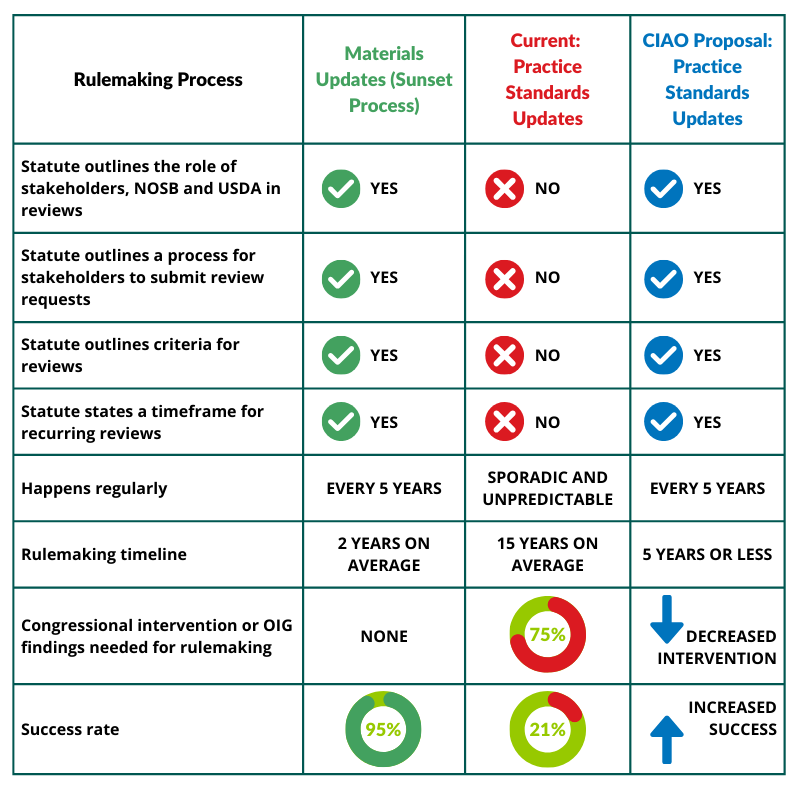
A critical component and distinguishing characteristic of the USDA organic program is the industry’s ongoing commitment to participate in the reevaluation of standards to ensure the label remains consistent with the intentions of the organic community. The proposed Continuous Improvement and Accountability in Organic Standards Act (CIAO), establishes a more transparent and codified process to allow for the standard to evolve over time, a necessary step to ensure a healthy market and the credibility of the USDA organic seal. Enactment of CIAO will result in an increased success rate for implementing proposed updates to the organic practice standards. How do we know? The organic industry has already seen incredible success updating the list of allowed and prohibited substances through a similar process generally referred to as “sunset review.”

Congress ensured regular updates to permitted substances through the Organic Foods Production Act (OFPA) by requiring the National Organic Program (NOP) to use the National Organic Standards Board (NOSB), a group comprised of USDA-appointed industry representatives serving 5-year voluntary terms, to review and vote on all materials listed on the National List of Allowed and Prohibited Substances (aka “the National List”). The sunset review process happens on a 5-year cycle for each material and is an effective and predictable process for the organic community to follow and provide input to. Congress designed sunset review to provide a dependable mechanism for new and previously listed items to be evaluated/reevaluated for consistency with the organic standard as new information becomes available. In effect, this process provides a way to make the standard a dynamic entity capable of reflecting the current beliefs of the industry.
Sunset review is designed to ensure all materials on the National List are given appropriate time for a formal review by the NOSB, and multiple opportunities for public comment prior to the 5-year sunset date of the material. This process creates consistency and predictability for the industry; a critical function since the National List contains materials that operations build their production practices and ingredients around. Any unexpected changes could prove devastating to a company reliant on any one National List item. The NOSB uses specific criteria stipulated in OFPA to review whether a material is necessary or essential due to lack of alternatives, if it is hazardous to human health or the environment, and if a material is compatible with the tenets of organic farming and handling.
Sunset review is a clear and predictable process with each material discussed at two sequential NOSB meetings. The spring meeting requests and receives public comment about the necessity of the material, or continued concern in the case of prohibitions, and in the fall meeting the NOSB formally votes on the material having considered the public comments and any new technical reviews, panels, or documents presented to the board. The NOSB voting activities follow the requirements as defined in the OFPA, and a two-thirds vote from the board is needed for a final decision on a material. Once voted upon by the NOSB at the fall meeting, the USDA NOP either renews the listing or considers the board’s decision to remove the listing and the process is complete for the next 5-year cycle.
The sunset process is an exemplary example of how a clear and defined process can allow the industry the stability and predictability to build their businesses while maintaining the ability to have a standard capable of evolving to meet the needs and beliefs of the industry. CIAO would establish a commensurate process to allow for the organic standards to evolve over time, offer the opportunity for the community to inform the direction of change, and provide transparency and stability to ensure organic operations and stakeholders can make necessary changes when the standard incorporates new requirements.
